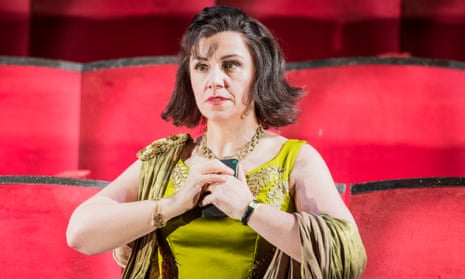Imperial Rome becomes a modern-day theatre in Walter Sutcliffe’s Grange festival production of Agrippina, Handel’s dark 1709 comedy that takes the events surrounding Nero’s nomination as emperor as the starting point for an acerbic satire on the games played – and lies told – in the name of political expediency.
The curtain rises on an auditorium not unlike the one in which the audience is sitting, where we find Anna Bonitatibus’s duplicitous Agrippina setting the protagonists against each other in an attempt to secure the imperial succession for her son. The audience, meanwhile, become the Roman populace as Raffaele Pé’s leather-clad, blinged-up Nerone roams the stalls, touting for support. The set later revolves to reveal a grubby backstage area, where hidden agendas surface as Christopher Ainslie’s idealistic Ottone and Ashley Riches’ dimwit Claudio vie with Nerone for the sexual attentions of Stefanie True’s self-assured Poppea. Sutcliffe’s insights into the self-dramatising nature of political life are clever, astute and wonderfully funny throughout.
It sounds good, too. Bonitatibus, a great artist, gives a terrific central performance, gloriously sung, with recitatives and arias flawlessly integrated into a dramatic whole. Pé’s voice is a bit grainy, though his swaying sicilianas have bags of insidious charm, and his big coloratura tantrums suggest real malice. Ainslie does exquisite things with Vaghe Fonti, and Riches has fun with Claudio’s preposterously self-important vocal lines. In the pit, the Academy of Ancient Music play with sensuous clarity for Robert Howarth. There are some cuts in the score – a few too many, perhaps – but this is a classy, provocative entertainment, and hugely enjoyable.
- Agrippina plays at the Grange festival until 6 July. Box office: 01962 792203.

Comments (…)
Sign in or create your Guardian account to join the discussion